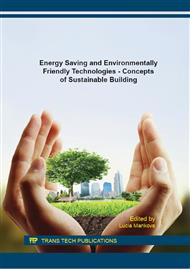p.461
p.469
p.477
p.485
p.493
p.503
p.511
p.519
p.527
Overhead Reduction or Energy Efficiency Measures
Abstract:
The energy efficiency minimum requirements determined at the Decree 2006/7 by the Minister without Portfolio, has been amended in 2015, only prescribes cost optimisation levels corresponding in strictness to those by the European Union as set out in the Directive 2010/631 EU for state or EU founded renovations. With the artificial decrease in energy prices in Hungary in 2012, requirements originally considered as optimal has changed and tightening is not needed any more. By maintaining the old requirements, the energy consumption and CO2 emission of renovated and newly constructed buildings will stay below optimum levels. Ignoring actual energy prices results in an apparently low return on constructing energy efficient buildings while energy awareness is also decreasing as a result of these measures. One may wonder about the energy efficiency measures that could have been financed from the savings coming from the enforced utility cost reduction, ones that would have resulted in real energy savings, thus benefitting both the users of buildings and the implementation of Hungarian commitments with the deadline of 2020.
Info:
Periodical:
Pages:
493-502
DOI:
Citation:
Online since:
January 2016
Authors:
Price:
Сopyright:
© 2016 Trans Tech Publications Ltd. All Rights Reserved
Share:
Citation:


